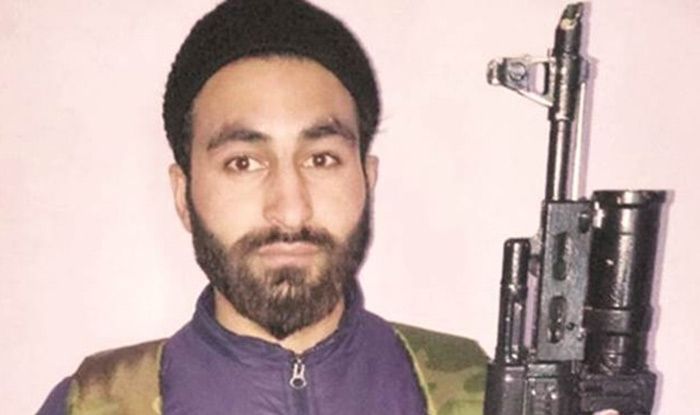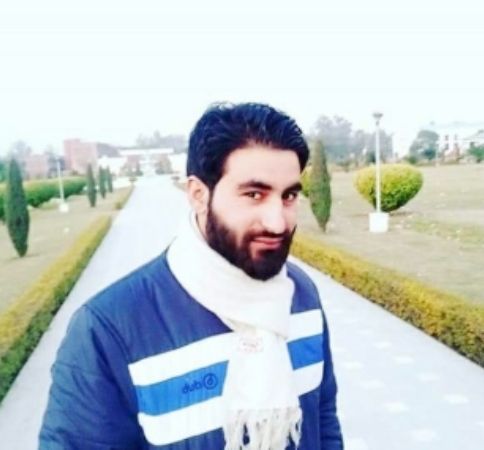 Scholar turned militant commander, Manan Wani
Scholar turned militant commander, Manan WaniSrinagar: The scholar turned militant commander, Manan Wani, 27, was killed within 15 days after he came under the radar of the security agencies, top police officials, who are in the know how of the operation, said.
Manan and his another accomplice, Ashiq Hussain Zargar, were killed on October 11 this year at Shartgund Bala, Qalamabad in north Kashmir’s Handwara area. He was a commander of hizbul mujahideen militant outfit.
Giving a peep into the operation, a group of police officials, who wanted to remain anonymous, said the vital lead came after Manan’s two friends, who were his friends and worked as Over Ground Workers (OGW’s) for him, were picked up by the police after they came to know that they have arranged a vehicle for him and his another associate, who hailed from Shopian. They identified his other associate who is bespectacled and has studied in a Dar-ul-Uloom (religious seminary).
“Both of the OGW’s were university students,” police officials told The Kashmir Press.
“One of them arranged the vehicle for Manan and his accomplice. Another one transported them to Awantipora. From there both of them boarded the vehicle and left for north Kashmir’s Baramulla district”. [pullquote]The Kashmir Press Exclusive[/pullquote]
Officials said that both of the OGW’s were arrested from a neighboring district of Srinagar, located north of the capital city.
“One of them belonged to that very district,” police officials told The Kashmir Press.
The police officials said the OGW’s exactly knew the locations and other information of Manan and his accomplice.
“The information was extracted from the two OGW’s. Later they were released,” police officials said.
“But the police kept them under strict monitoring, followed their movements, and tracked their conversations”.

Scholar turned militant commander, Manan Wani, when he was student
Following the concrete leader, the police started tracking movement of Manan and his accomplice in north Kashmir.
“As the searches were on, the OGW’s were also being monitored,” the police officials told The Kashmir Press.
“Finally we had a concrete lead information about their locations and the movement. We acquired the leads within 15 days after OGW’s were arrested”.
They said that when contingents of police and army finally laid the siege of the small hamlet of Shartgund Bala, Qalamabad, they had full idea that Manan was trapped there.
“The siege was laid in the predawn hours at around 3 a.m on October 11,” police officials said.
“They militants came out of the house firing some shots. There was an exchange of fire of 15 to 20 rounds. This led to their fleeing from the house”.
Thereafter, the army and the police continued their searches for a couple of hours. But to no avail.
“The moment the forces were winding up the operations, one of the trooper spotted boots of Manan near the culvert of a bridge. When they were challenged, it was responded with fire. Then started an brief gunfight which led to the killing of Manan and his another accomplice”.
The police officials, however, said they were surprised to find his accomplice Ashiq Hussain Zargar instead of the militant from Shopian.
“He is yet to be traced. We have no idea where he has gone,” police officials said.

Scholar turned militant commander, Manan Wani, participating in an academic conference
What was Manan doing in north Kashmir?
According to the police officials, closely monitoring Manan’s actvity, he shifted to north Kashmir to strengthen the militancy in the region.
“The commander of the Hizbul Mujahideen, Riyaz Naikoo, had realized that there were enough recruits who had joined the militant ranks in south Kashmir. Almost 150 recruits have joined the militancy this year,” police officials told The Kashmir Press.
“Naikoo felt that militancy in north Kashmir should also be strengthened since they can not take more recruits into their fold in South Kashmir, mainly due to the shortage of weapons”.
The police officials believe that two militants, who were killed with government forces on August 02 this year in Lolab, were recruited by the Manan.
The slain militants were killed inside the vehicle near a checkpoint in Lolab. They were identified as Zahoor Ahmad and Bilal Ahmad Shah of Shatmuqam village. The police had claimed that the two militants had snatched INSAS rifle from a policeman in the Kupwara district.
“His accomplice, Ashiq Hussain Zargar, who was killed along with him was also recruited by Manan,” police officials said.
“If Manan would have been alive, he would have changed the map of militancy in north Kashmir. His intellect would have provided much needed elixir to the new recruits”.

Scholar turned militant commander, Manan Wani posing for a picture
Manan, 27, was a PhD scholar at Aligarh Muslim University before he joined the militant ranks of the Hizbul Mujahideen in January 2018. He had been studying Applied Geology.
After he went missing from AMU, his picture, holding an AK assault rifle, appeared on the social media.
He shot to fame after he wrote two long articles, describing why he had picked up guns and joined the armed militants. The articles were instantly shared and widely read even as police stopped media from publishing them.
The day Manan was killed, his death was widely condoled on social media and by political leaders across the divide.
Hurriyat leader Mirwaiz Umar Farooq, Peoples Democratic Party (PDP) leader, Mehbooba Mufti and other expressed condolences and mourned the loss of “budding intellectual and a writer”. All of them stressed for the talks to resolve “Kashmir” so as to save the “young and educated Kashmiris”.
On the day of his death, the government kept his killing secret until it took all the measures to prevent situation from turning “out of hand”. They also stopped media from covering his funeral prayers.
Despite that, the Kashmir observed a strike and large number of Kashmiris remembered him on social media.
“There is no doubt he was poplar. We did not want another 2016,” police officials said. “That is why we withheld information”.
Asked whether Manan’s killings would have any bearing on the map of militancy in Kashmir, the police officials shrugged their shoulders in disapproval.
“We did not want him to die,” police officials said. “He should not have died”.
“In Kashmir, nothing is going to change with the killing of militants. Things will go up and down. If you believe that militancy will end with the killings alone, it wont happen. We are in the job from past 20 years. Nothing changes here, just names and statistics. It seems crude, but this reality”.
